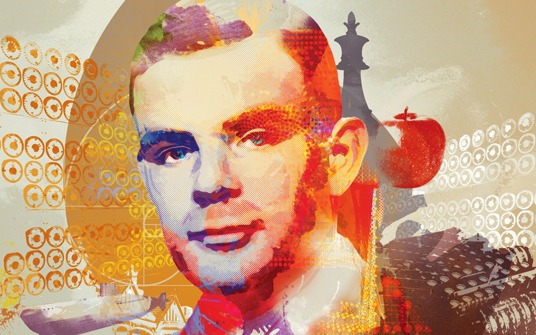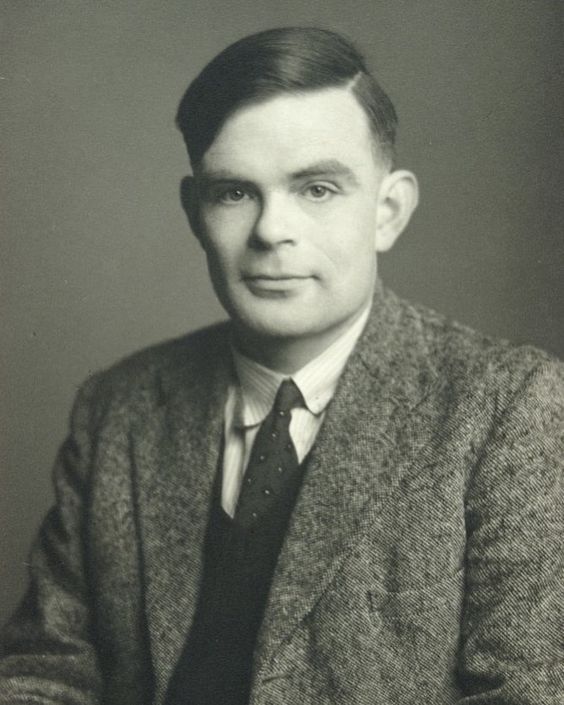
Written by Chanelle Descroizilles
Writing this blog after the month of June, which is pride month around the world, has made me contemplate how far the queer community has come, but also about how much further we have to go. I am writing from my personal computer in my quarantined home during a global pandemic. During this incredibly difficult time, it has been an enormous help that most people have some form of access to the internet using a computer, laptop, tablet, or cell phone. This is all thanks to one individual. This person is credited with saving millions of lives during the Second World War due to the invention of the first reprogrammable machine. He is the founder of computer science and artificial intelligence. His name is Alan Turing. Most people do not know his name as quickly as say, Steve Jobs, arguably because of his sexuality. He was a gay man in 1940s Britain.
Turing can be credited for an incredible amount of our comforts today. In 1945, Turing came up with the Automatic Computing Machine, the first digital computer with stored programmes. Previous computers did not have electric memory storage and had to be manually rewired to switch between different programmes. In 1936, Turing delivered a paper, On Computable Numbers, with an Application to the Entscheidungsproblem. In this paper, he presented the notion of a universal machine capable of computing anything that is computable. It is considered the precursor to the modern computer. This universal machine was later called Universal Turing Machine and eventually the Turing machine; however, today we call them computers, and where would we be without them.

Turing was a leading participant in wartime code-breaking, particularly that of Enigma which was the secret German communication during World War II. He worked at Bletchley Park, which was home to a wartime station: The Government Code and Cypher School (GCCS), a British code-breaking organisation. While working there, Turing made five crucial advances in the field of cryptanalysis, including specifically the bombe. The bombe was an electromechanical device that was used to help decipher German Enigma encrypted signals. Bombe allowed codebreakers to decipher up to 4000 messages a day. By one estimate, his work may have cut the war short by more than two years, and he is therefore credited with saving millions of lives. Some historians believe that due to the breaking of Enigma, fourteen million lives were saved.
Turing made a significant impact on the field of artificial intelligence. He created a test for machine intelligence. It is known as the Turing test, and he wrote a paper on it in 1950. The Turing Test still exists to today and is thus a true testament to Turing’s work as it has proved to be long-lasting. Over the past several decades, the test has significantly influenced debates over artificial intelligence. This is not the only area that Turing had an impact on. He also studied physics, biology, chemistry and neurology. In 1952, Turing worked on morphogenesis, a completely new field of mathematical biology. It explained how things grow, which was ground-breaking at the time and a great mystery to science.
In 1952, Turing was arrested and charged for “indecency” (a term commonly used in place of saying someone was homosexual during that time) and was forced to choose between chemical castration or prison. In order for Turing to continue his work in this innovating field, he ultimately opts for his physical freedom over his bodily integrity – a choice no one should have to make. This chemical castration was a series of hormone injections that Turing received for two years, leaving him with gynecomastia (the physical growth of the male breast tissue due to high levels of oestrogen) and impotent. Homosexuality was considered a security risk during that time, and the conviction cost Turing his security clearance for secret work for the British government. Additionally, he was restricted from leaving the country. The effect of this left Turing unable to travel to Norway and the Mediterranean, as he had done previously, to advocate for gay rights. After two years of chemical castration at the age of 41, Turing took his own life.
Turing has, more recently, been recognised in a variety of ways. A number of books have been written about Alan Turing. These have brought some awareness to his life and accomplishments. One specific book “Alan Turing: The Enigma” written by Andrew Hodges in 1983, was even subsequently turned into a movie in 2014 entitled “The Imitation Game”. This book and film brought some exposure to Turing’s life. In 1999, Time magazine named Turing one of its “100 Most Important People of the 20th century,” saying, “The fact remains that everyone who taps at a keyboard, opening a spreadsheet or a word-processing programme, is working on an incarnation of a Turing machine.”
Shortly after World War II, Alan Turing was awarded an Order of the British Empire (OBE) for his work. Two statues have been erected of him to honour his legacy. The first is at the University of Surrey, and it was put in place in 2004 to mark the 50th anniversary of Turing’s death. The second was placed at Bletchley Park in 2007. In 2013, Alan Turing received a royal pardon for his conviction by Queen Elizabeth II. His photo will appear on the new 50-pound note which is set to enter circulation by the end of 2021.
Most fittingly, Turing has also had a law named after him, Turing’s Law, which posthumously pardons individuals convicted of “indecency”. However, Turing was only one of the many men who suffered after being prosecuted for their homosexuality under 19th-century British indecency laws. Homosexuality was decriminalised in the UK in 1967, but the previous convictions were only overturned a few years ago. In 2017 Turing’s Law went into effect. Approximately 65 000 men were sentenced under the outdated law. According to one of the activists who campaigned for the mass pardons, around 15 000 of the 65 000 gay men, who were convicted under the outdated law, are still alive.
Turing saved millions of lives in the war, advanced various fields and created the first reprogrammable machine. He achieved a great deal in his short lifetime and had an incredible potential to give and do more for the world, for the good of humanity. This individual has had an enormous impact on our current society, and yet most people do not know who he was because he was queer. So, I pose two questions after a pride month where the world is in a global pandemic, and many pride parades have not been able to take place. And how far has the queer community come, but also about how much further we have to go? How many other significant people in history do we not know about because of their sexuality?
